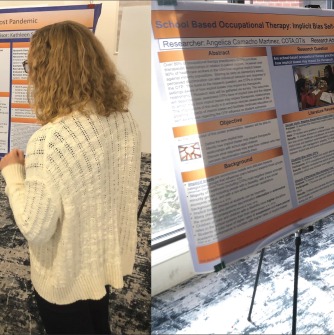| Contact |
Center for Research and Creative Activities
|
|---|
In late October, Occupational Therapy graduate students Kiley Hall and Angelica Camacho Martinez presented at the Massachusetts Association for Occupational Therapy (MAOT) 2022 Annual Conference. The conference celebrated its centennial year of supporting professionals and research in occupational therapy. Hall and Camacho Martinez presented during the first poster session, where conference attendees could hold personal conversations with the presenters.
Faculty research advisor Professor Kathleen Schlenz has been supporting the pair throughout their research exploration in the MS in Occupational Therapy (OT) program. The degree involves a series of three scaffolded courses that ask students to choose a long-term research question to investigate and develop throughout the program. In doing so, students learn about OT research practices while also applying real-world skills to create new knowledge in the field. This past August, Professor Schlenz encouraged Hall and Camacho Martinez to submit their ongoing research for consideration at the MAOT annual conference. The students’ proposals were accepted, and they presented their work to an audience of occupational therapy professionals on October 28.
Social Participation is one of nine everyday activities (or "occupations") that occupational therapy professionals are trained to evaluate and treat in the promotion of health, wellness, and quality of life. Hall’s presentation, titled “Young Children’s Social Play Skills Post Pandemic,” stems from Hall’s first-hand experience of observing the consequences of Covid-19 on school-age children: social distancing, wearing masks and less social play. These observations inspired Hall to observe how social isolation has adversely affected the social play and development of children, how mitigation efforts during the pandemic impacted children, and how occupational therapists are addressing these concerns.
For Hall, presenting at the MAOT conference was a significant opportunity to spread the word about her research. Hall felt comforted receiving feedback from other professionals, who recognized the work she was doing was important, and was fascinated by how other research projects presented overlapping questions and themes. Returning from the conference, Hall feels more confident that the work she is doing as a graduate student can contribute to the field in a substantial way.
Education is another everyday activity where occupational therapy practitioners offer expertise. Camacho Martinez’s research, titled “School Based Occupational Therapy: Implicit Bias Self-Assessment Survey,” is inspired by her experiences in public school systems, as a mentor for female-identifying students, and as a practicing occupational therapy assistant over the past decade. Camacho Martinez’s research analyzes discrimination in health and public education systems, asserting that implicit biases can be harmful to how children perceive themselves, beginning as early as primary school. For the main investigation, Camacho Martinez asks how aware OT professionals are of how their implicit biases may impact the therapeutic relationship with school-age adolescents.
Camacho Martinez notes that, as a Latin American woman, she experienced implicit and explicit biases throughout her childhood. While pursuing a career path in occupational therapy, Camacho Martinez has made sense of these experiences, which has inspired her to support youth who may be facing similar discrimination in their school systems. In the OT program, students are taught to regard their patients holistically; for Camacho Martinez, this holistic concept also extends to the OT practitioner themself, who should regularly engage in self-reflection. When presenting these ideas at the MAOT conference, Camacho Martinez notes that she felt some anxiety about presenting such a sensitive topic. However, Camacho Martinez says, the audience of OT professionals received her work with kindness, openness, and support.
Currently, Hall and Camacho Martinez are in the data collection phase of their research, after receiving the necessary approval from the Institutional Review Board at Salem State. In this phase, OT students have full control over the data collection. For both Hall and Camacho Martinez, this means distributing exploratory questionnaires via Survey Monkey that asks OT professionals to reflect on their experiences as it relates to each student’s research. After they complete collecting data at the end of this year, Hall and Camacho Martinez will begin the analysis phase of their research projects.
In March 2023, Hall, Camacho Martinez, and their classmates in the graduating cohort of the master’s in occupational therapy program will host the annual OT Graduate Student Research Conference at Salem State. (Click here for the CRCA’s reporting on last year’s conference.) At the event, students in the program, professionals in the field, and Salem State community members can talk with OT students about their research and scholarly achievements. As Professor Schlenz says, the event is an opportunity to engage with Salem State’s dedicated OT students, who “represent the best for the future of our profession as they bring a depth of critical thinking balanced with a compassionate eye toward social justice for all those who could benefit from the health, wellness, access, and dignity that comes from an occupational lens on the lifespan.”
Congratulations, Kiley and Angelica; we look forward to seeing you at SSU’s OT Graduate Student Research Conference in March!
------
Do you want to share your research and creative activities with the SSU community? Contact the CRCA at ssu-crca@salemstate.edu and tell us what you’ve been up to!

